An Analysis of Educational Leadership and Management in Institutions
VerifiedAdded on 2022/09/17
|10
|2630
|32
Essay
AI Summary
This essay provides a comprehensive overview of educational leadership and management, exploring the fundamental differences between the two concepts and their roles within educational institutions. It delves into various leadership theories and models, including trait leadership, transformational leadership, and pedagogical leadership, highlighting their application in different educational settings. The essay examines the skills and responsibilities of leaders and managers, differentiating their approaches to governance, innovation, and ethical practices. Furthermore, it discusses the importance of curriculum building and the role of pedagogical leaders in fostering a positive learning environment, emphasizing the need for collaboration between educators, children, and parents. The essay also addresses the evolution of leadership typologies and the significance of effective communication and resource management in achieving educational goals. Overall, the essay underscores the importance of both leadership and management in creating a conducive environment for student learning and institutional growth.
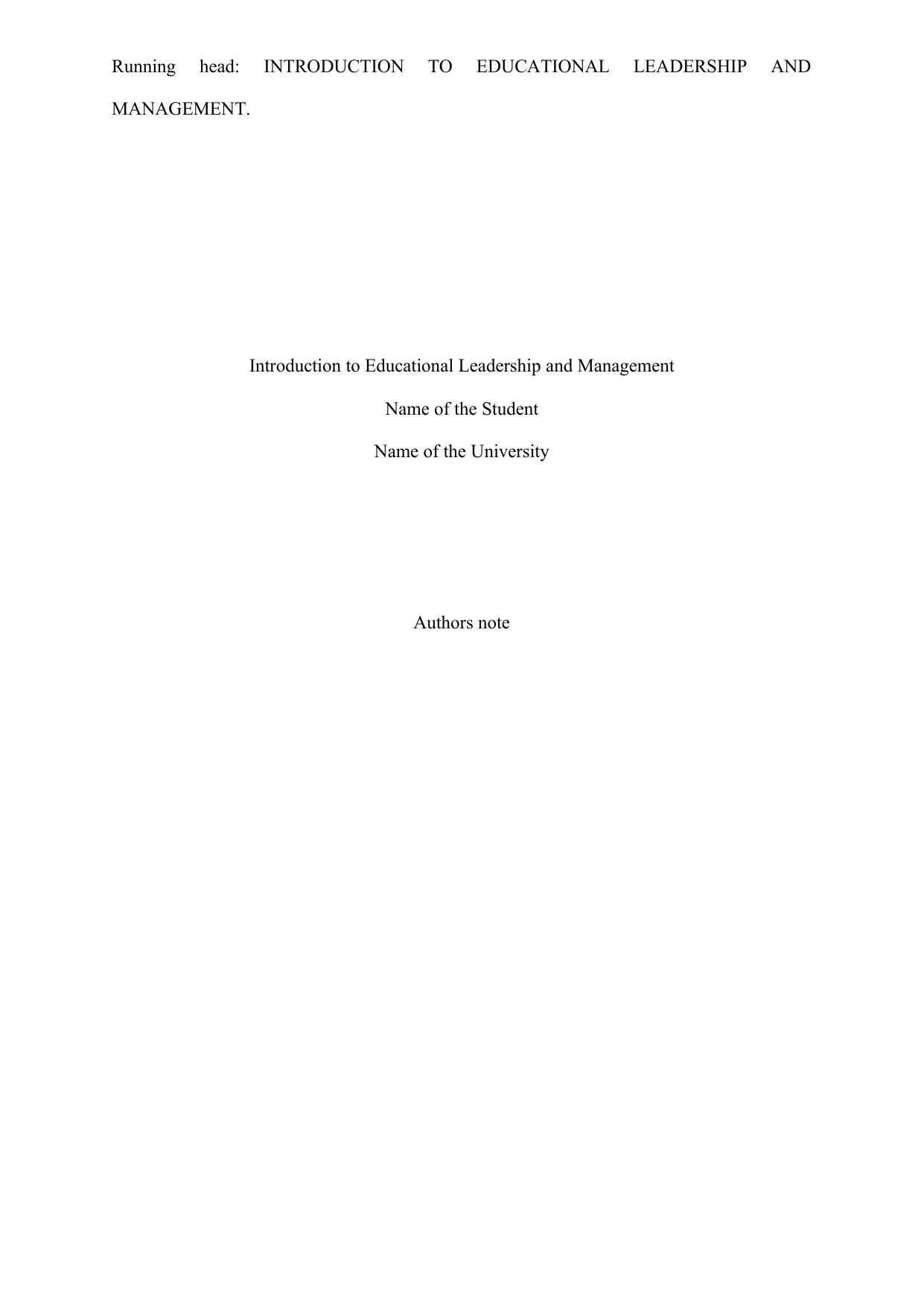
Running head: INTRODUCTION TO EDUCATIONAL LEADERSHIP AND
MANAGEMENT.
Introduction to Educational Leadership and Management
Name of the Student
Name of the University
Authors note
MANAGEMENT.
Introduction to Educational Leadership and Management
Name of the Student
Name of the University
Authors note
Paraphrase This Document
Need a fresh take? Get an instant paraphrase of this document with our AI Paraphraser
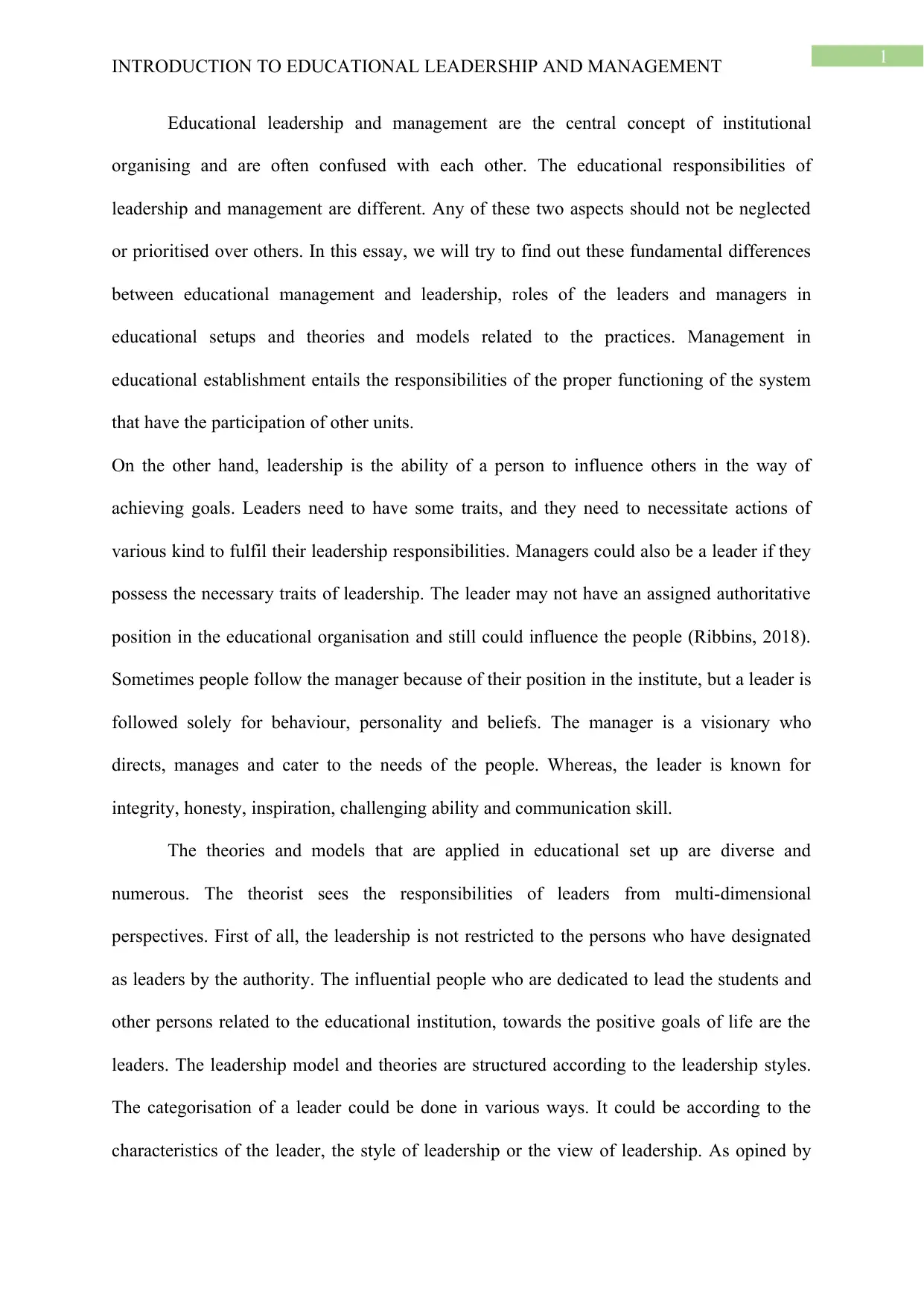
1
INTRODUCTION TO EDUCATIONAL LEADERSHIP AND MANAGEMENT
Educational leadership and management are the central concept of institutional
organising and are often confused with each other. The educational responsibilities of
leadership and management are different. Any of these two aspects should not be neglected
or prioritised over others. In this essay, we will try to find out these fundamental differences
between educational management and leadership, roles of the leaders and managers in
educational setups and theories and models related to the practices. Management in
educational establishment entails the responsibilities of the proper functioning of the system
that have the participation of other units.
On the other hand, leadership is the ability of a person to influence others in the way of
achieving goals. Leaders need to have some traits, and they need to necessitate actions of
various kind to fulfil their leadership responsibilities. Managers could also be a leader if they
possess the necessary traits of leadership. The leader may not have an assigned authoritative
position in the educational organisation and still could influence the people (Ribbins, 2018).
Sometimes people follow the manager because of their position in the institute, but a leader is
followed solely for behaviour, personality and beliefs. The manager is a visionary who
directs, manages and cater to the needs of the people. Whereas, the leader is known for
integrity, honesty, inspiration, challenging ability and communication skill.
The theories and models that are applied in educational set up are diverse and
numerous. The theorist sees the responsibilities of leaders from multi-dimensional
perspectives. First of all, the leadership is not restricted to the persons who have designated
as leaders by the authority. The influential people who are dedicated to lead the students and
other persons related to the educational institution, towards the positive goals of life are the
leaders. The leadership model and theories are structured according to the leadership styles.
The categorisation of a leader could be done in various ways. It could be according to the
characteristics of the leader, the style of leadership or the view of leadership. As opined by
INTRODUCTION TO EDUCATIONAL LEADERSHIP AND MANAGEMENT
Educational leadership and management are the central concept of institutional
organising and are often confused with each other. The educational responsibilities of
leadership and management are different. Any of these two aspects should not be neglected
or prioritised over others. In this essay, we will try to find out these fundamental differences
between educational management and leadership, roles of the leaders and managers in
educational setups and theories and models related to the practices. Management in
educational establishment entails the responsibilities of the proper functioning of the system
that have the participation of other units.
On the other hand, leadership is the ability of a person to influence others in the way of
achieving goals. Leaders need to have some traits, and they need to necessitate actions of
various kind to fulfil their leadership responsibilities. Managers could also be a leader if they
possess the necessary traits of leadership. The leader may not have an assigned authoritative
position in the educational organisation and still could influence the people (Ribbins, 2018).
Sometimes people follow the manager because of their position in the institute, but a leader is
followed solely for behaviour, personality and beliefs. The manager is a visionary who
directs, manages and cater to the needs of the people. Whereas, the leader is known for
integrity, honesty, inspiration, challenging ability and communication skill.
The theories and models that are applied in educational set up are diverse and
numerous. The theorist sees the responsibilities of leaders from multi-dimensional
perspectives. First of all, the leadership is not restricted to the persons who have designated
as leaders by the authority. The influential people who are dedicated to lead the students and
other persons related to the educational institution, towards the positive goals of life are the
leaders. The leadership model and theories are structured according to the leadership styles.
The categorisation of a leader could be done in various ways. It could be according to the
characteristics of the leader, the style of leadership or the view of leadership. As opined by
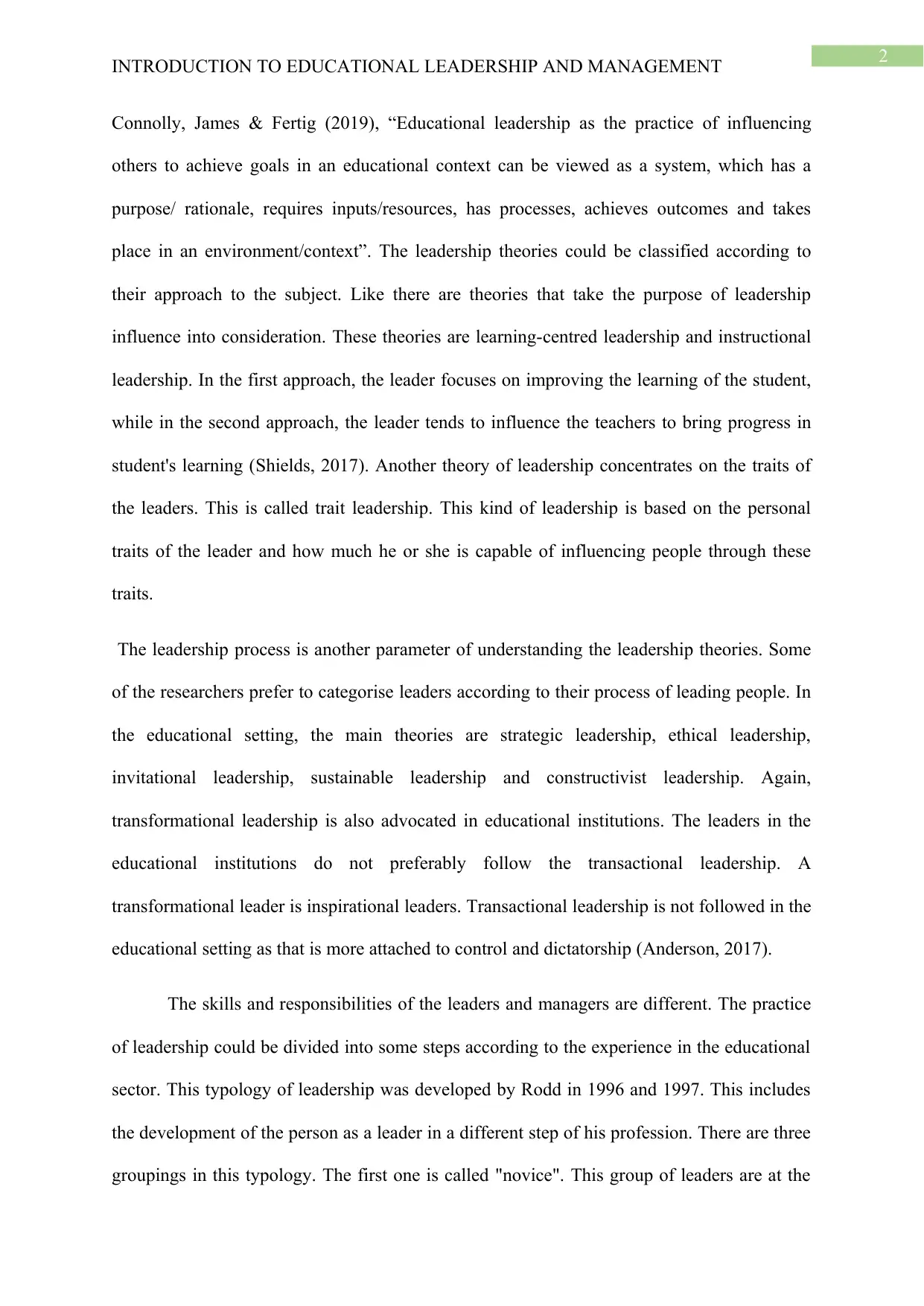
2
INTRODUCTION TO EDUCATIONAL LEADERSHIP AND MANAGEMENT
Connolly, James & Fertig (2019), “Educational leadership as the practice of influencing
others to achieve goals in an educational context can be viewed as a system, which has a
purpose/ rationale, requires inputs/resources, has processes, achieves outcomes and takes
place in an environment/context”. The leadership theories could be classified according to
their approach to the subject. Like there are theories that take the purpose of leadership
influence into consideration. These theories are learning-centred leadership and instructional
leadership. In the first approach, the leader focuses on improving the learning of the student,
while in the second approach, the leader tends to influence the teachers to bring progress in
student's learning (Shields, 2017). Another theory of leadership concentrates on the traits of
the leaders. This is called trait leadership. This kind of leadership is based on the personal
traits of the leader and how much he or she is capable of influencing people through these
traits.
The leadership process is another parameter of understanding the leadership theories. Some
of the researchers prefer to categorise leaders according to their process of leading people. In
the educational setting, the main theories are strategic leadership, ethical leadership,
invitational leadership, sustainable leadership and constructivist leadership. Again,
transformational leadership is also advocated in educational institutions. The leaders in the
educational institutions do not preferably follow the transactional leadership. A
transformational leader is inspirational leaders. Transactional leadership is not followed in the
educational setting as that is more attached to control and dictatorship (Anderson, 2017).
The skills and responsibilities of the leaders and managers are different. The practice
of leadership could be divided into some steps according to the experience in the educational
sector. This typology of leadership was developed by Rodd in 1996 and 1997. This includes
the development of the person as a leader in a different step of his profession. There are three
groupings in this typology. The first one is called "novice". This group of leaders are at the
INTRODUCTION TO EDUCATIONAL LEADERSHIP AND MANAGEMENT
Connolly, James & Fertig (2019), “Educational leadership as the practice of influencing
others to achieve goals in an educational context can be viewed as a system, which has a
purpose/ rationale, requires inputs/resources, has processes, achieves outcomes and takes
place in an environment/context”. The leadership theories could be classified according to
their approach to the subject. Like there are theories that take the purpose of leadership
influence into consideration. These theories are learning-centred leadership and instructional
leadership. In the first approach, the leader focuses on improving the learning of the student,
while in the second approach, the leader tends to influence the teachers to bring progress in
student's learning (Shields, 2017). Another theory of leadership concentrates on the traits of
the leaders. This is called trait leadership. This kind of leadership is based on the personal
traits of the leader and how much he or she is capable of influencing people through these
traits.
The leadership process is another parameter of understanding the leadership theories. Some
of the researchers prefer to categorise leaders according to their process of leading people. In
the educational setting, the main theories are strategic leadership, ethical leadership,
invitational leadership, sustainable leadership and constructivist leadership. Again,
transformational leadership is also advocated in educational institutions. The leaders in the
educational institutions do not preferably follow the transactional leadership. A
transformational leader is inspirational leaders. Transactional leadership is not followed in the
educational setting as that is more attached to control and dictatorship (Anderson, 2017).
The skills and responsibilities of the leaders and managers are different. The practice
of leadership could be divided into some steps according to the experience in the educational
sector. This typology of leadership was developed by Rodd in 1996 and 1997. This includes
the development of the person as a leader in a different step of his profession. There are three
groupings in this typology. The first one is called "novice". This group of leaders are at the
⊘ This is a preview!⊘
Do you want full access?
Subscribe today to unlock all pages.

Trusted by 1+ million students worldwide
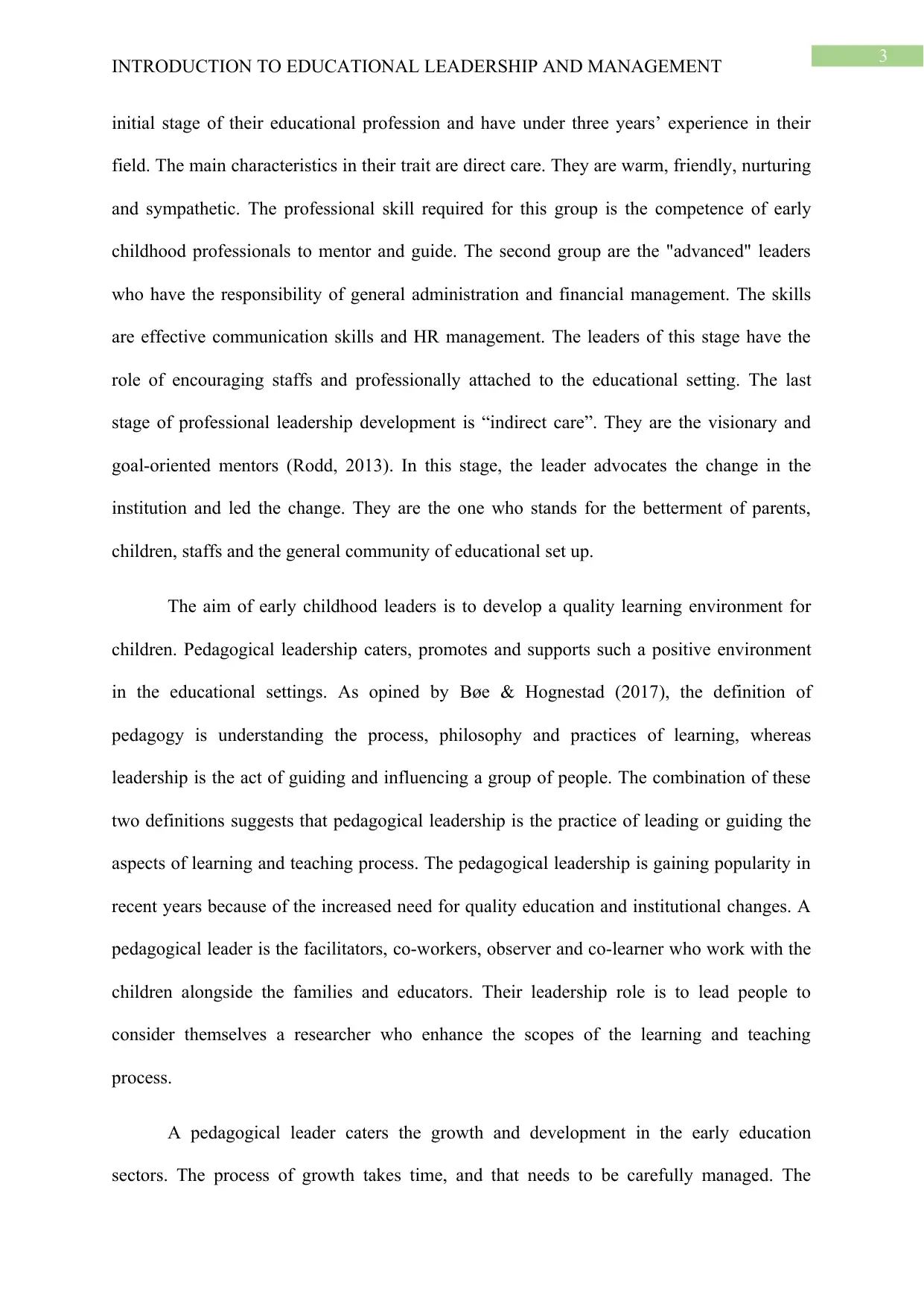
3
INTRODUCTION TO EDUCATIONAL LEADERSHIP AND MANAGEMENT
initial stage of their educational profession and have under three years’ experience in their
field. The main characteristics in their trait are direct care. They are warm, friendly, nurturing
and sympathetic. The professional skill required for this group is the competence of early
childhood professionals to mentor and guide. The second group are the "advanced" leaders
who have the responsibility of general administration and financial management. The skills
are effective communication skills and HR management. The leaders of this stage have the
role of encouraging staffs and professionally attached to the educational setting. The last
stage of professional leadership development is “indirect care”. They are the visionary and
goal-oriented mentors (Rodd, 2013). In this stage, the leader advocates the change in the
institution and led the change. They are the one who stands for the betterment of parents,
children, staffs and the general community of educational set up.
The aim of early childhood leaders is to develop a quality learning environment for
children. Pedagogical leadership caters, promotes and supports such a positive environment
in the educational settings. As opined by Bøe & Hognestad (2017), the definition of
pedagogy is understanding the process, philosophy and practices of learning, whereas
leadership is the act of guiding and influencing a group of people. The combination of these
two definitions suggests that pedagogical leadership is the practice of leading or guiding the
aspects of learning and teaching process. The pedagogical leadership is gaining popularity in
recent years because of the increased need for quality education and institutional changes. A
pedagogical leader is the facilitators, co-workers, observer and co-learner who work with the
children alongside the families and educators. Their leadership role is to lead people to
consider themselves a researcher who enhance the scopes of the learning and teaching
process.
A pedagogical leader caters the growth and development in the early education
sectors. The process of growth takes time, and that needs to be carefully managed. The
INTRODUCTION TO EDUCATIONAL LEADERSHIP AND MANAGEMENT
initial stage of their educational profession and have under three years’ experience in their
field. The main characteristics in their trait are direct care. They are warm, friendly, nurturing
and sympathetic. The professional skill required for this group is the competence of early
childhood professionals to mentor and guide. The second group are the "advanced" leaders
who have the responsibility of general administration and financial management. The skills
are effective communication skills and HR management. The leaders of this stage have the
role of encouraging staffs and professionally attached to the educational setting. The last
stage of professional leadership development is “indirect care”. They are the visionary and
goal-oriented mentors (Rodd, 2013). In this stage, the leader advocates the change in the
institution and led the change. They are the one who stands for the betterment of parents,
children, staffs and the general community of educational set up.
The aim of early childhood leaders is to develop a quality learning environment for
children. Pedagogical leadership caters, promotes and supports such a positive environment
in the educational settings. As opined by Bøe & Hognestad (2017), the definition of
pedagogy is understanding the process, philosophy and practices of learning, whereas
leadership is the act of guiding and influencing a group of people. The combination of these
two definitions suggests that pedagogical leadership is the practice of leading or guiding the
aspects of learning and teaching process. The pedagogical leadership is gaining popularity in
recent years because of the increased need for quality education and institutional changes. A
pedagogical leader is the facilitators, co-workers, observer and co-learner who work with the
children alongside the families and educators. Their leadership role is to lead people to
consider themselves a researcher who enhance the scopes of the learning and teaching
process.
A pedagogical leader caters the growth and development in the early education
sectors. The process of growth takes time, and that needs to be carefully managed. The
Paraphrase This Document
Need a fresh take? Get an instant paraphrase of this document with our AI Paraphraser
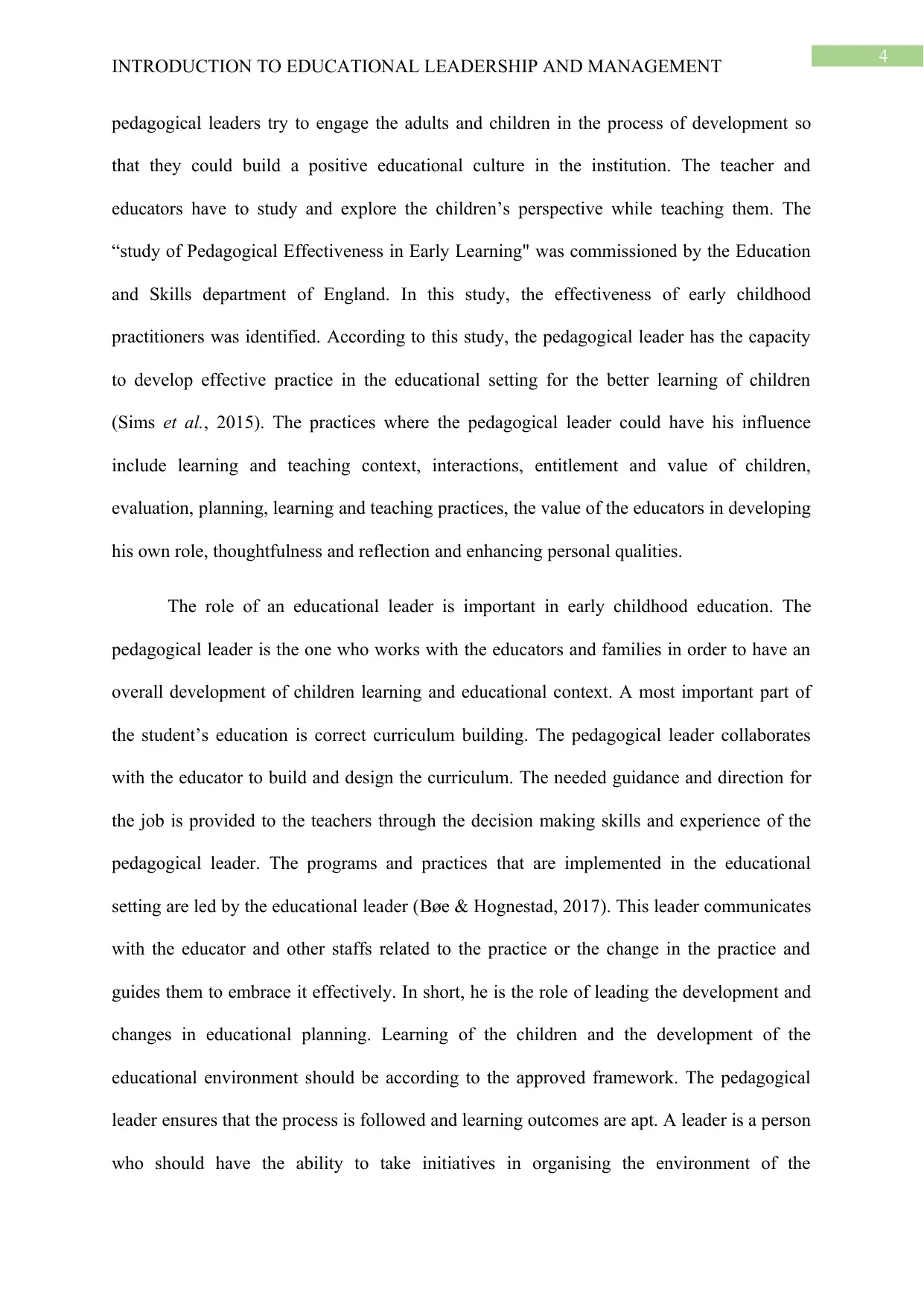
4
INTRODUCTION TO EDUCATIONAL LEADERSHIP AND MANAGEMENT
pedagogical leaders try to engage the adults and children in the process of development so
that they could build a positive educational culture in the institution. The teacher and
educators have to study and explore the children’s perspective while teaching them. The
“study of Pedagogical Effectiveness in Early Learning" was commissioned by the Education
and Skills department of England. In this study, the effectiveness of early childhood
practitioners was identified. According to this study, the pedagogical leader has the capacity
to develop effective practice in the educational setting for the better learning of children
(Sims et al., 2015). The practices where the pedagogical leader could have his influence
include learning and teaching context, interactions, entitlement and value of children,
evaluation, planning, learning and teaching practices, the value of the educators in developing
his own role, thoughtfulness and reflection and enhancing personal qualities.
The role of an educational leader is important in early childhood education. The
pedagogical leader is the one who works with the educators and families in order to have an
overall development of children learning and educational context. A most important part of
the student’s education is correct curriculum building. The pedagogical leader collaborates
with the educator to build and design the curriculum. The needed guidance and direction for
the job is provided to the teachers through the decision making skills and experience of the
pedagogical leader. The programs and practices that are implemented in the educational
setting are led by the educational leader (Bøe & Hognestad, 2017). This leader communicates
with the educator and other staffs related to the practice or the change in the practice and
guides them to embrace it effectively. In short, he is the role of leading the development and
changes in educational planning. Learning of the children and the development of the
educational environment should be according to the approved framework. The pedagogical
leader ensures that the process is followed and learning outcomes are apt. A leader is a person
who should have the ability to take initiatives in organising the environment of the
INTRODUCTION TO EDUCATIONAL LEADERSHIP AND MANAGEMENT
pedagogical leaders try to engage the adults and children in the process of development so
that they could build a positive educational culture in the institution. The teacher and
educators have to study and explore the children’s perspective while teaching them. The
“study of Pedagogical Effectiveness in Early Learning" was commissioned by the Education
and Skills department of England. In this study, the effectiveness of early childhood
practitioners was identified. According to this study, the pedagogical leader has the capacity
to develop effective practice in the educational setting for the better learning of children
(Sims et al., 2015). The practices where the pedagogical leader could have his influence
include learning and teaching context, interactions, entitlement and value of children,
evaluation, planning, learning and teaching practices, the value of the educators in developing
his own role, thoughtfulness and reflection and enhancing personal qualities.
The role of an educational leader is important in early childhood education. The
pedagogical leader is the one who works with the educators and families in order to have an
overall development of children learning and educational context. A most important part of
the student’s education is correct curriculum building. The pedagogical leader collaborates
with the educator to build and design the curriculum. The needed guidance and direction for
the job is provided to the teachers through the decision making skills and experience of the
pedagogical leader. The programs and practices that are implemented in the educational
setting are led by the educational leader (Bøe & Hognestad, 2017). This leader communicates
with the educator and other staffs related to the practice or the change in the practice and
guides them to embrace it effectively. In short, he is the role of leading the development and
changes in educational planning. Learning of the children and the development of the
educational environment should be according to the approved framework. The pedagogical
leader ensures that the process is followed and learning outcomes are apt. A leader is a person
who should have the ability to take initiatives in organising the environment of the
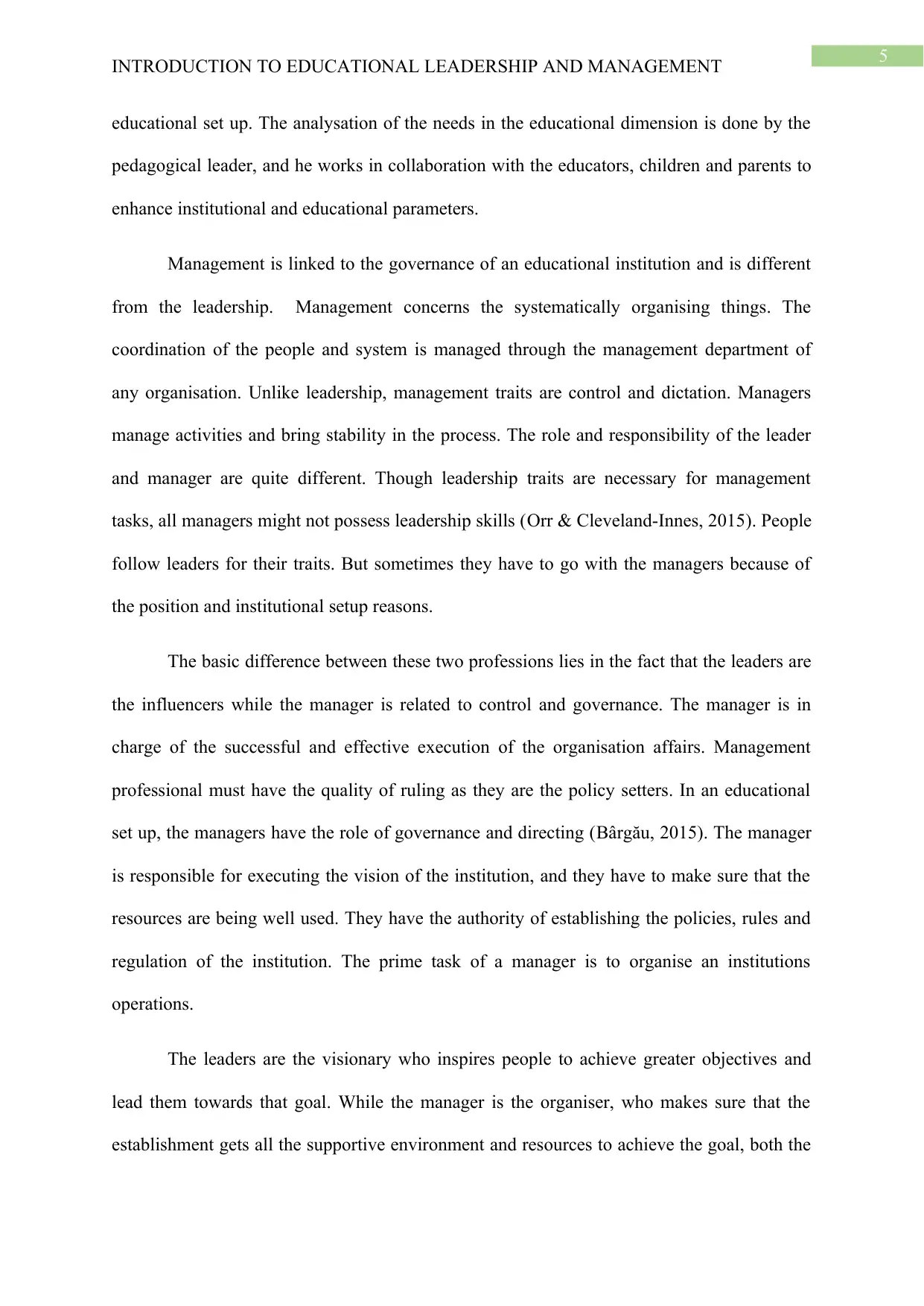
5
INTRODUCTION TO EDUCATIONAL LEADERSHIP AND MANAGEMENT
educational set up. The analysation of the needs in the educational dimension is done by the
pedagogical leader, and he works in collaboration with the educators, children and parents to
enhance institutional and educational parameters.
Management is linked to the governance of an educational institution and is different
from the leadership. Management concerns the systematically organising things. The
coordination of the people and system is managed through the management department of
any organisation. Unlike leadership, management traits are control and dictation. Managers
manage activities and bring stability in the process. The role and responsibility of the leader
and manager are quite different. Though leadership traits are necessary for management
tasks, all managers might not possess leadership skills (Orr & Cleveland-Innes, 2015). People
follow leaders for their traits. But sometimes they have to go with the managers because of
the position and institutional setup reasons.
The basic difference between these two professions lies in the fact that the leaders are
the influencers while the manager is related to control and governance. The manager is in
charge of the successful and effective execution of the organisation affairs. Management
professional must have the quality of ruling as they are the policy setters. In an educational
set up, the managers have the role of governance and directing (Bârgău, 2015). The manager
is responsible for executing the vision of the institution, and they have to make sure that the
resources are being well used. They have the authority of establishing the policies, rules and
regulation of the institution. The prime task of a manager is to organise an institutions
operations.
The leaders are the visionary who inspires people to achieve greater objectives and
lead them towards that goal. While the manager is the organiser, who makes sure that the
establishment gets all the supportive environment and resources to achieve the goal, both the
INTRODUCTION TO EDUCATIONAL LEADERSHIP AND MANAGEMENT
educational set up. The analysation of the needs in the educational dimension is done by the
pedagogical leader, and he works in collaboration with the educators, children and parents to
enhance institutional and educational parameters.
Management is linked to the governance of an educational institution and is different
from the leadership. Management concerns the systematically organising things. The
coordination of the people and system is managed through the management department of
any organisation. Unlike leadership, management traits are control and dictation. Managers
manage activities and bring stability in the process. The role and responsibility of the leader
and manager are quite different. Though leadership traits are necessary for management
tasks, all managers might not possess leadership skills (Orr & Cleveland-Innes, 2015). People
follow leaders for their traits. But sometimes they have to go with the managers because of
the position and institutional setup reasons.
The basic difference between these two professions lies in the fact that the leaders are
the influencers while the manager is related to control and governance. The manager is in
charge of the successful and effective execution of the organisation affairs. Management
professional must have the quality of ruling as they are the policy setters. In an educational
set up, the managers have the role of governance and directing (Bârgău, 2015). The manager
is responsible for executing the vision of the institution, and they have to make sure that the
resources are being well used. They have the authority of establishing the policies, rules and
regulation of the institution. The prime task of a manager is to organise an institutions
operations.
The leaders are the visionary who inspires people to achieve greater objectives and
lead them towards that goal. While the manager is the organiser, who makes sure that the
establishment gets all the supportive environment and resources to achieve the goal, both the
⊘ This is a preview!⊘
Do you want full access?
Subscribe today to unlock all pages.

Trusted by 1+ million students worldwide
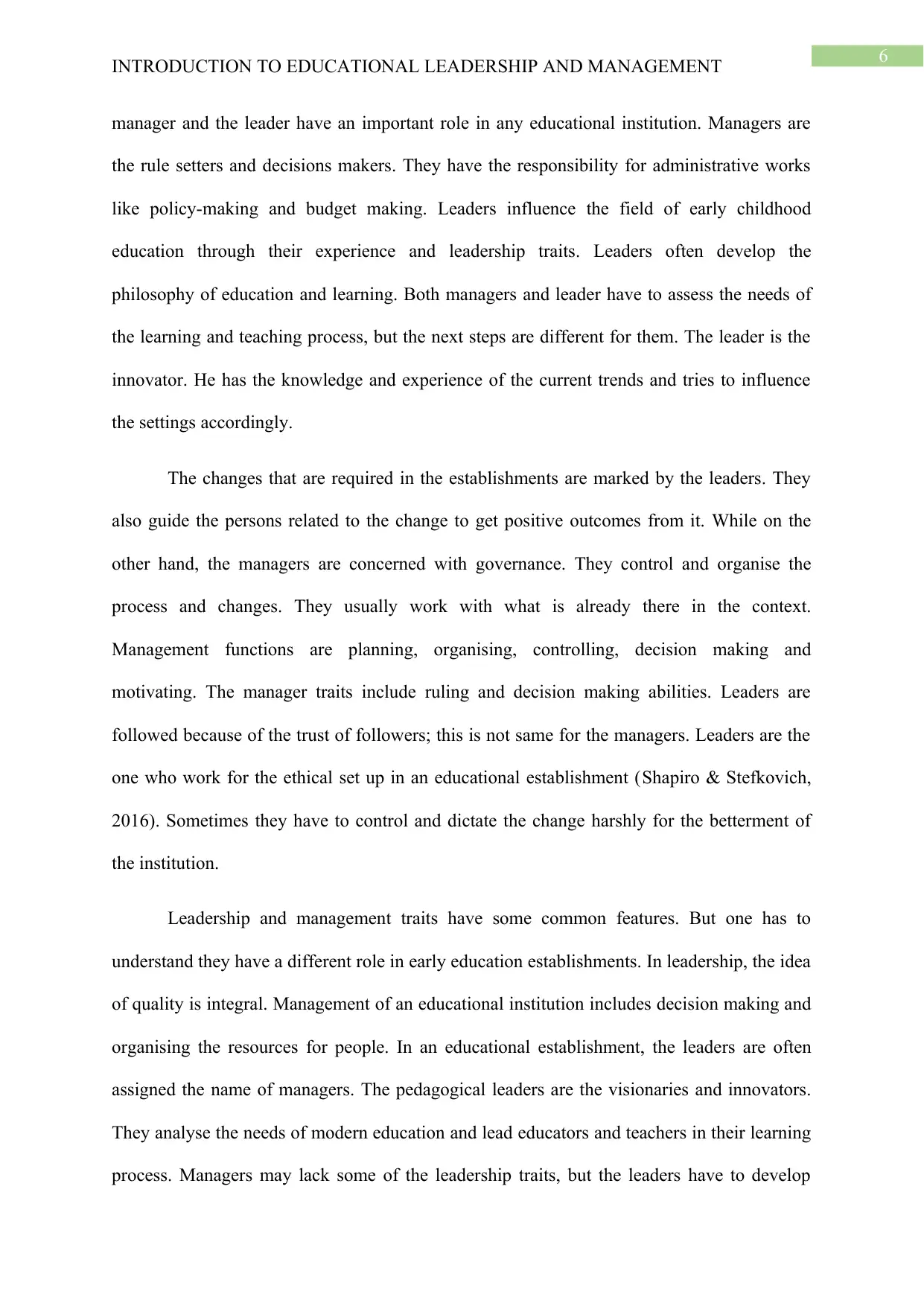
6
INTRODUCTION TO EDUCATIONAL LEADERSHIP AND MANAGEMENT
manager and the leader have an important role in any educational institution. Managers are
the rule setters and decisions makers. They have the responsibility for administrative works
like policy-making and budget making. Leaders influence the field of early childhood
education through their experience and leadership traits. Leaders often develop the
philosophy of education and learning. Both managers and leader have to assess the needs of
the learning and teaching process, but the next steps are different for them. The leader is the
innovator. He has the knowledge and experience of the current trends and tries to influence
the settings accordingly.
The changes that are required in the establishments are marked by the leaders. They
also guide the persons related to the change to get positive outcomes from it. While on the
other hand, the managers are concerned with governance. They control and organise the
process and changes. They usually work with what is already there in the context.
Management functions are planning, organising, controlling, decision making and
motivating. The manager traits include ruling and decision making abilities. Leaders are
followed because of the trust of followers; this is not same for the managers. Leaders are the
one who work for the ethical set up in an educational establishment (Shapiro & Stefkovich,
2016). Sometimes they have to control and dictate the change harshly for the betterment of
the institution.
Leadership and management traits have some common features. But one has to
understand they have a different role in early education establishments. In leadership, the idea
of quality is integral. Management of an educational institution includes decision making and
organising the resources for people. In an educational establishment, the leaders are often
assigned the name of managers. The pedagogical leaders are the visionaries and innovators.
They analyse the needs of modern education and lead educators and teachers in their learning
process. Managers may lack some of the leadership traits, but the leaders have to develop
INTRODUCTION TO EDUCATIONAL LEADERSHIP AND MANAGEMENT
manager and the leader have an important role in any educational institution. Managers are
the rule setters and decisions makers. They have the responsibility for administrative works
like policy-making and budget making. Leaders influence the field of early childhood
education through their experience and leadership traits. Leaders often develop the
philosophy of education and learning. Both managers and leader have to assess the needs of
the learning and teaching process, but the next steps are different for them. The leader is the
innovator. He has the knowledge and experience of the current trends and tries to influence
the settings accordingly.
The changes that are required in the establishments are marked by the leaders. They
also guide the persons related to the change to get positive outcomes from it. While on the
other hand, the managers are concerned with governance. They control and organise the
process and changes. They usually work with what is already there in the context.
Management functions are planning, organising, controlling, decision making and
motivating. The manager traits include ruling and decision making abilities. Leaders are
followed because of the trust of followers; this is not same for the managers. Leaders are the
one who work for the ethical set up in an educational establishment (Shapiro & Stefkovich,
2016). Sometimes they have to control and dictate the change harshly for the betterment of
the institution.
Leadership and management traits have some common features. But one has to
understand they have a different role in early education establishments. In leadership, the idea
of quality is integral. Management of an educational institution includes decision making and
organising the resources for people. In an educational establishment, the leaders are often
assigned the name of managers. The pedagogical leaders are the visionaries and innovators.
They analyse the needs of modern education and lead educators and teachers in their learning
process. Managers may lack some of the leadership traits, but the leaders have to develop
Paraphrase This Document
Need a fresh take? Get an instant paraphrase of this document with our AI Paraphraser

7
INTRODUCTION TO EDUCATIONAL LEADERSHIP AND MANAGEMENT
their skills on the basis of experience. There could be some training for early childhood
education leaders to enhance their qualities. Leaders, unlike the managers, work with people
for the improvement of the quality of education and learning to collaborate with the families,
children and educators.
INTRODUCTION TO EDUCATIONAL LEADERSHIP AND MANAGEMENT
their skills on the basis of experience. There could be some training for early childhood
education leaders to enhance their qualities. Leaders, unlike the managers, work with people
for the improvement of the quality of education and learning to collaborate with the families,
children and educators.
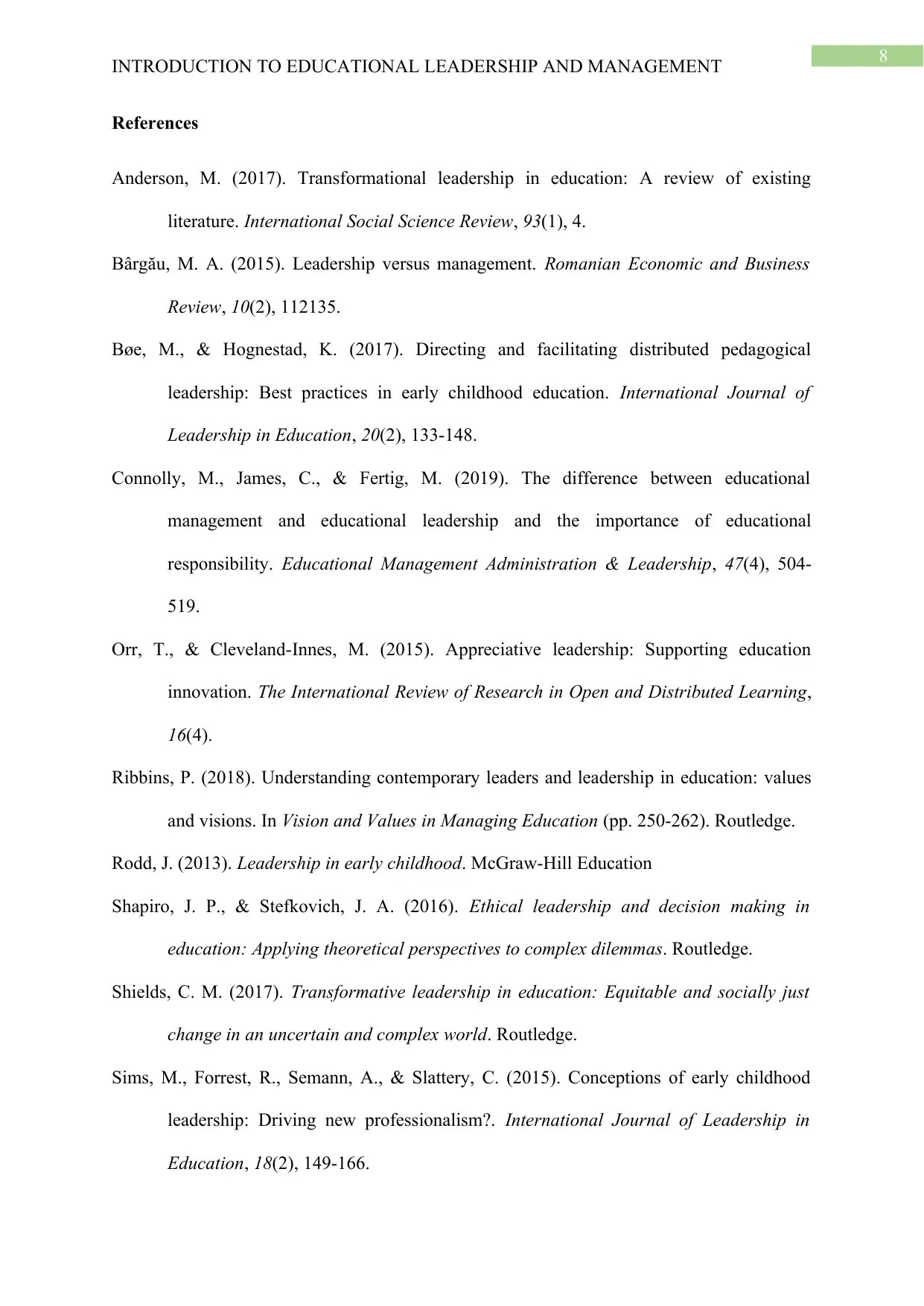
8
INTRODUCTION TO EDUCATIONAL LEADERSHIP AND MANAGEMENT
References
Anderson, M. (2017). Transformational leadership in education: A review of existing
literature. International Social Science Review, 93(1), 4.
Bârgău, M. A. (2015). Leadership versus management. Romanian Economic and Business
Review, 10(2), 112135.
Bøe, M., & Hognestad, K. (2017). Directing and facilitating distributed pedagogical
leadership: Best practices in early childhood education. International Journal of
Leadership in Education, 20(2), 133-148.
Connolly, M., James, C., & Fertig, M. (2019). The difference between educational
management and educational leadership and the importance of educational
responsibility. Educational Management Administration & Leadership, 47(4), 504-
519.
Orr, T., & Cleveland-Innes, M. (2015). Appreciative leadership: Supporting education
innovation. The International Review of Research in Open and Distributed Learning,
16(4).
Ribbins, P. (2018). Understanding contemporary leaders and leadership in education: values
and visions. In Vision and Values in Managing Education (pp. 250-262). Routledge.
Rodd, J. (2013). Leadership in early childhood. McGraw-Hill Education
Shapiro, J. P., & Stefkovich, J. A. (2016). Ethical leadership and decision making in
education: Applying theoretical perspectives to complex dilemmas. Routledge.
Shields, C. M. (2017). Transformative leadership in education: Equitable and socially just
change in an uncertain and complex world. Routledge.
Sims, M., Forrest, R., Semann, A., & Slattery, C. (2015). Conceptions of early childhood
leadership: Driving new professionalism?. International Journal of Leadership in
Education, 18(2), 149-166.
INTRODUCTION TO EDUCATIONAL LEADERSHIP AND MANAGEMENT
References
Anderson, M. (2017). Transformational leadership in education: A review of existing
literature. International Social Science Review, 93(1), 4.
Bârgău, M. A. (2015). Leadership versus management. Romanian Economic and Business
Review, 10(2), 112135.
Bøe, M., & Hognestad, K. (2017). Directing and facilitating distributed pedagogical
leadership: Best practices in early childhood education. International Journal of
Leadership in Education, 20(2), 133-148.
Connolly, M., James, C., & Fertig, M. (2019). The difference between educational
management and educational leadership and the importance of educational
responsibility. Educational Management Administration & Leadership, 47(4), 504-
519.
Orr, T., & Cleveland-Innes, M. (2015). Appreciative leadership: Supporting education
innovation. The International Review of Research in Open and Distributed Learning,
16(4).
Ribbins, P. (2018). Understanding contemporary leaders and leadership in education: values
and visions. In Vision and Values in Managing Education (pp. 250-262). Routledge.
Rodd, J. (2013). Leadership in early childhood. McGraw-Hill Education
Shapiro, J. P., & Stefkovich, J. A. (2016). Ethical leadership and decision making in
education: Applying theoretical perspectives to complex dilemmas. Routledge.
Shields, C. M. (2017). Transformative leadership in education: Equitable and socially just
change in an uncertain and complex world. Routledge.
Sims, M., Forrest, R., Semann, A., & Slattery, C. (2015). Conceptions of early childhood
leadership: Driving new professionalism?. International Journal of Leadership in
Education, 18(2), 149-166.
⊘ This is a preview!⊘
Do you want full access?
Subscribe today to unlock all pages.

Trusted by 1+ million students worldwide

9
INTRODUCTION TO EDUCATIONAL LEADERSHIP AND MANAGEMENT
Waite, D. (2016). The where and what of education today: A leadership perspective.
INTRODUCTION TO EDUCATIONAL LEADERSHIP AND MANAGEMENT
Waite, D. (2016). The where and what of education today: A leadership perspective.
1 out of 10
Related Documents
Your All-in-One AI-Powered Toolkit for Academic Success.
+13062052269
info@desklib.com
Available 24*7 on WhatsApp / Email
![[object Object]](/_next/static/media/star-bottom.7253800d.svg)
Unlock your academic potential
Copyright © 2020–2026 A2Z Services. All Rights Reserved. Developed and managed by ZUCOL.





